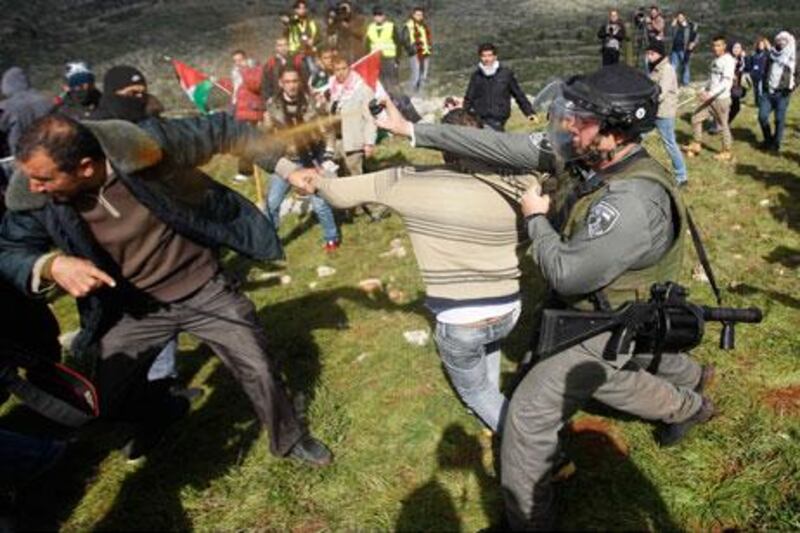TEL AVIV // An Israeli rights group said yesterday that the number of Israeli soldiers indicted by the army for crimes against Palestinians had dropped significantly.
The report by Yesh Din, an organisation that opposes Israel's occupation of the West Bank and tracks violations of Palestinians' liberties there, comes amid growing condemnation by activists of the Israeli army's treatment of Palestinians.
The group suggested that a lack of accountability may have resulted in more killings of unarmed Palestinians by Israeli troops.
According to Yesh Din, at least four unarmed Palestinians in the West Bank and at least one in the Gaza Strip were shot and killed by Israeli soldiers during the second half of January.
"Soldiers know they can get away with anything in the Palestinian territories," said Lior Yavne, the director of research at Yesh Din. "They are not afraid of the law. There is no legal deterrent for them not to carry out crimes against Palestinians."
The report said that last year, the Israeli army's criminal investigation division did not indict any soldiers for committing crimes against Palestinians.
That compares with the years from 2009 until 2011, when the rate of the army's indictments amounted to about 2.5 per cent of the 864 complaints by Palestinians.
That rate had halved from previous years, Yesh Din said. Between 2000 - when the group began tracking such indictments - and 2009, the rate of such charges against soldiers was about 5 per cent of the total Palestinian complaints, it said.
"This creates a feeling of lawlessness on the ground, which may be a central contributing factor in the rise in the number of killings over the recent weeks," the report said.
Yesh Din said it had calculated the rate of indictments from data it received from the Israeli army.
While the group did not include details of any indicidual cases, Mr Yavne cited several media reports of crimes by soldiers that typically resulted in a complaint to the Israeli army investigators' unit.
Those included a report by the Palestinian news agency Maan in February last year that cited accounts of Israeli forces near the West Bank town of Jenin beating a Palestinian who had tried to cross a temporary checkpoint.
Another Maan report quoted relatives of a Palestinian man from a village near the West Bank town of Bethlehem who said that he had suffered two broken legs when he was assaulted by soldiers near Israel's separation barrier.
Dror Etkes, a veteran anti-settlement activist, said the right-wing policies of Israel's government discouraged the army from advancing Palestinian complaints of violations to the stage of indictments against soldiers.
"The military investigators understand that there is no expectation from the Israeli government or Israeli public to seriously investigate crimes against Palestinians, regardless of whether they are carried out by soldiers or settlers," he said.
According to Mr Etkes, Israel also does not want soldiers to worry about being held accountable for violence against Palestinians, which could restrict their actions when guarding Israeli settlements in the West Bank.
"Soldiers would be more afraid - and therefore less efficient - in protecting Israel's settlement enterprise if they faced more charges of crimes against Palestinians," he said.
Indeed, the Israeli military makes it difficult for Palestinians to file a complaint in the first place, according to Yesh Din.
There are no headquarters for the Israeli army's military investigators' unit in the West Bank, forcing Palestinians to convey their reports of crimes through Israeli police officers posted at Israel's administrative offices throughout the territory.
Many of the complaints "get lost along the way" to the army's investigative unit within Israel's recognised borders, Mr Livne said.
Last year, he said, only six out of 240 complaints by Palestinians were dispatched directly to the army investigators unit - either by letter or telephone.
Once the complaints were filed, the chance of indictments is scant. Partly, that is because opening investigations into such claims often takes months or even years, reducing the chances of finding concrete proof against soldiers.
In addition, details of complaints may be unclear because Palestinians often have to convey them through translators since most army investigators do not speak Arabic.
Finally, the investigators do not go to the scene of the alleged crime and mainly rely on accounts from the complainants and soldiers, Mr Yavne said.
The Israeli army played down Yesh Din's figures, saying they could not provide "significant insight into the level of due process given". It insisted that every case was "approached independently and weighed in its own right".
[ foreign.desk@thenational.ae ]
twitter: For breaking news from the Gulf, the Middle East and around the globe follow The National World. Follow us






